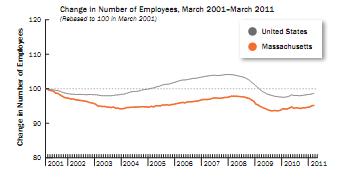Start-Ups Needed. Desperately.
Massachusetts has had some good short term news, creating jobs at a faster clip than the rest of the country. (Although, given the weak manufacturing data and general market weakness, I’d be concerned about popping the corks prematurely.)
But our state has a long-term problem. Massachusetts takes a long time to recover from recessions — It also took us almost two and a half times as long as the rest of the country to regain the jobs we lost in the ’90-’91 recession. We never fully recovered from the 2001 recession, while the rest of the country created millions of jobs before the 2007 recession hit. In the diagram below, you can see that the national number of jobs (the black line) rises above the baseline several years after the 2001 recession while the Massachusetts line (orange line) never does.
In his latest paper for Pioneer, Northeastern Professor John Friar finds that companies three years old or younger have been the key to creating jobs in Massachusetts after a recession. These younger firms started to create jobs almost immediately in the wake of the 1990-91 and 2001 recessions, but older firms only began creating jobs (on a net basis between contraction and expansion) in the fifth year after each recession. In the aftermath of the 2001 downturn, older firms only created jobs for a year before the next recession hit.
The dilemma facing us is that the rate of start-up creation has slowed in recent years. We have fewer young firms being created than we did in the ‘90s. Second, those that have started tended to employ fewer people than in the past. Average firm sizes in Massachusetts have dropped from 16 employees in 1990 to 9 employees in 2007. A smaller average firm size means we need even more start-ups to create jobs lost to the recession.
Cross-posted at Boston Daily.


